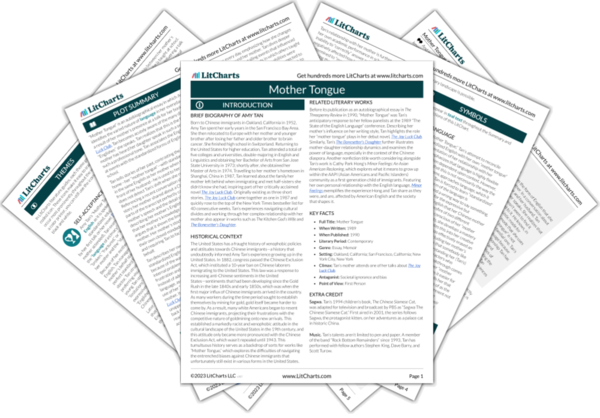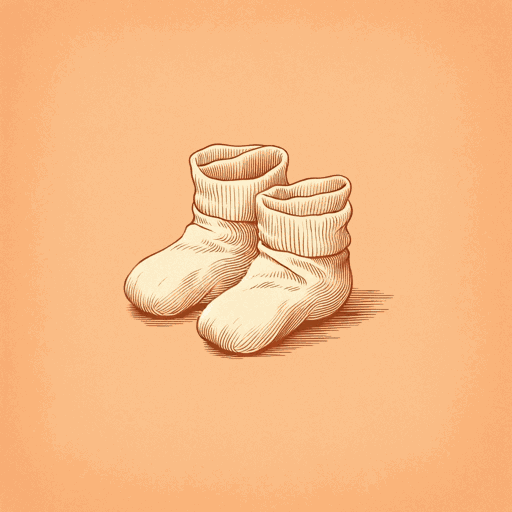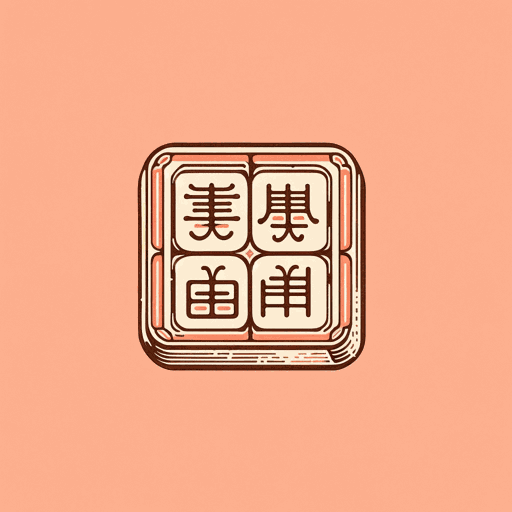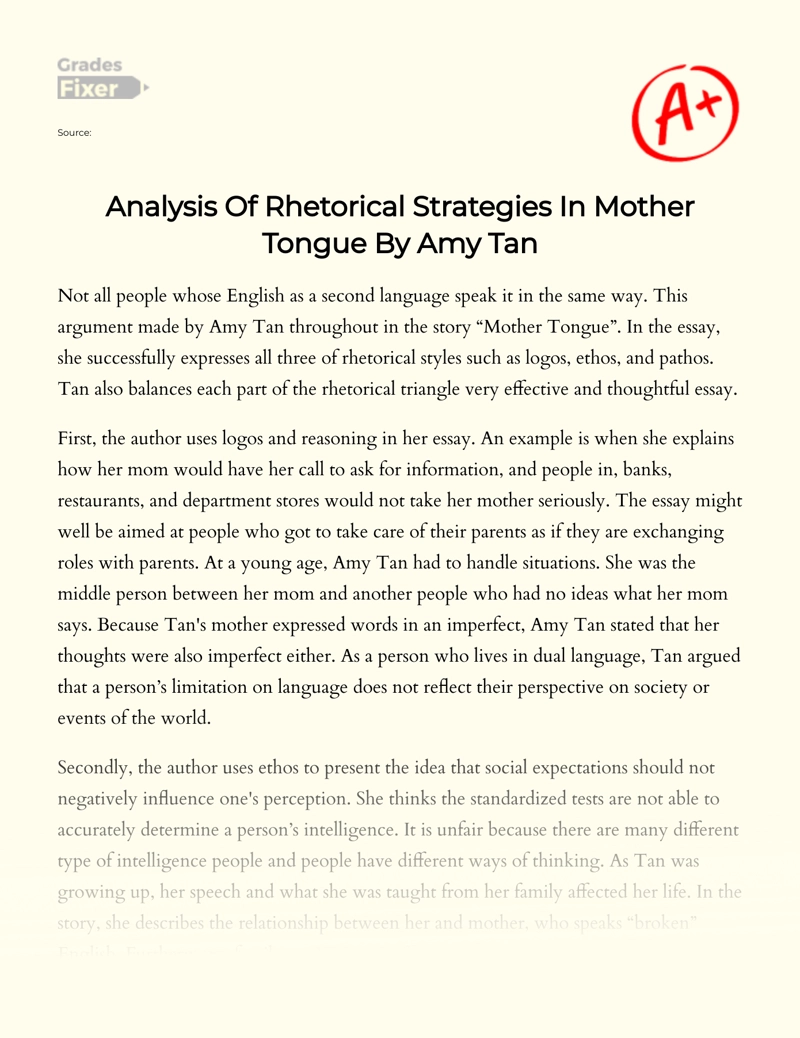

A Summary and Analysis of Amy Tan’s ‘Mother Tongue’
By Dr Oliver Tearle (Loughborough University)
‘Mother Tongue’ is an essay by Amy Tan, an American author who was born to Chinese immigrants in 1952. Tan wrote ‘Mother Tongue’ in 1990, a year after her novel The Joy Luck Club was a runaway success. In the essay, Tan discusses her relationship with language, and how her mother’s influence has shaped her use of English, as well as her attitude to it.
You can read ‘Mother Tongue’ here before proceeding to our summary and analysis of Amy Tan’s essay below.
‘Mother Tongue’: summary
Amy Tan begins her essay by offering her personal opinions on the English language. She recalls a recent talk she gave, when, upon realising her mother was in the audience, she was confronted with the fact that the formal standard English she was using in the public talk was at odds with the way she spoke at home with her mother. She then contrasts this with a moment when she was walking down the street with her mother and she used the more clipped, informal English she naturally uses with her mother, and her husband.
Tan calls this a ‘language of intimacy’. She points out that her mother is intelligent and reads things which Tan herself cannot begin to understand. But many people who hear her mother speak can only partially understand what she is saying, and some even say they can understand nothing of what she says, as if she were speaking pure Chinese to them.
Tan calls this clipped informal language her ‘mother tongue’, because it was the first language she learned and it helped to shape the way she saw the world and made sense of it.
Tan notes the difficulty of finding a term to describe the style of English her mother, as a Chinese immigrant to the United States, speaks. Many of the terms, such as ‘broken’ or ‘limited’, are too negative and imply her English is imperfect.
She acknowledges that when she was growing up, she was ashamed of the way her mother spoke. Her mother, too, was clearly aware of how her use of the language affected how seriously people took her, for she used to get her daughter to phone people and pretend to be ‘Mrs Tan’.
She observes that her mother is treated differently because of the way she speaks. She recounts a time when the doctors at the hospital were unsympathetic towards her mother when they lost the results of the CAT scan they had undertaken on her brain, but as soon as the hospital – at her mother’s insistence – called her daughter, they issued a grovelling apology.
Amy Tan also believes her mother’s English affected her daughter’s school results. Tan acknowledges that, whilst she did well in maths and science, subjects with a single correct answer, she was less adept at English. She struggled with tests which asked students to pick a correct word to fill in the blanks in a sentence because she was distracted by the imaginative and poetic possibilities of other words.
Indeed, Tan conjectures that many Asian American children are probably encouraged to pursue careers in jobs requiring maths and science rather than English for this reason. But because she is rebellious and likes to challenge people’s assumptions about her, Tan bucked this trend. She majored in English at college and began writing as a freelancer.
She began writing fiction in 1985, and after several false starts trying to find her own style and idiom, she began to write with her mother in mind as the ideal reader for her stories. Indeed, her mother read drafts of her work.
And Tan drew on all the Englishes , plural, that she knew: the ‘broken’ English her mother used, the ‘simple’ English Tan used when talking to her mother, the ‘watered-down’ Chinese her mother used, and her mother’s ‘internal’ language which conveyed her passion, intent, imagery, and the nature of her thoughts. When her mother told her that what she had written was easy to read, Tan knew that she had succeeded in her aims as a writer.
‘Mother Tongue’: analysis
The title of Amy Tan’s essay is a pun on the expression ‘mother tongue’, referring to one’s first language. But Tan’s language, or ‘tongue’, has been shaped by her actual mother, whose first language (or mother tongue) was not English, but Chinese.
The different forms of English that mother and daughter speak are also a product of their backgrounds: whilst Tan’s mother is a Chinese immigrant to America, Tan was born in the United States and has grown up, and been educated, in an English-speaking culture.
Much of Tan’s 1989 novel The Joy Luck Club is about daughters and their relationships with their mothers. But Tan’s interest in language, both as a cultural marker and as a way of expressing thought and personality, is also a prevailing theme of the novel.
In this respect, if the parable ‘ Feathers from a Thousand Li Away ’ acts as preface to the novel, ‘Mother Tongue’, in effect, acts as a kind of postscript. It helps us to understand the way Tan approaches and uses language within the stories that make up The Joy Luck Club .
An overarching theme of Tan’s novel is mothers emigrating to America in the hope that their daughters will have better lives than they did. This is a key part of ‘Feathers from a Thousand Li Away’, and it helps us to understand Tan’s conflicted attitude towards her mother’s use of language as explored in ‘Mother Tongue’.
Many of the mothers in The Joy Luck Club , such as Betty St. Clair in ‘The Voice from the Wall’, feel isolated from those around them, never at home in America, and hyper-aware of their outsider status, despite becoming legal permanent citizens in the country. Tan’s autobiographical revelations in ‘Mother Tongue’ show us that her own mother struggled to be taken seriously among Americans, and Tan diagnoses this struggle as a result of her mother’s different way of speaking.
Tan, by contrast, used standard English – what used to be referred to, in loaded phrases, as ‘correct’ or ‘proper’ English – and was thus able to succeed in getting herself, and by extension her mother, taken seriously by others. Language is thus more than just a cultural marker: Tan reveals, in ‘Mother Tongue’, the extent to which it is a tool of power (or, depending on the use, powerlessness), particularly for those from migrant backgrounds.
In this connection, it is noteworthy that Tan chooses to focus on the school tests she undertook before concluding that her mother’s ‘broken’ style of English has been misunderstood – not just literally (by some people who’ve known her), but in terms of the misleading perceptions of her it has led others to formulate.
The class tests at school which reduced English proficiency to an ability to recognise a ‘correct’ answer are thus contrasted with Tan’s resounding final words of ‘Mother Tongue’, which see her seeking to capture the passion of her mother, the ‘nature of her thoughts’, and the imagery she uses: all things which her daughter has clearly inherited a respect for, and which school tests fail to capture or observe.
Discover more from Interesting Literature
Subscribe now to keep reading and get access to the full archive.
Type your email…
Continue reading

Mother Tongue
Everything you need for every book you read..
Welcome to the LitCharts study guide on Amy Tan's Mother Tongue . Created by the original team behind SparkNotes, LitCharts are the world's best literature guides.
Mother Tongue: Introduction
Mother tongue: plot summary, mother tongue: detailed summary & analysis, mother tongue: themes, mother tongue: quotes, mother tongue: characters, mother tongue: terms, mother tongue: symbols, mother tongue: theme wheel, brief biography of amy tan.

Historical Context of Mother Tongue
Other books related to mother tongue.
- Full Title: Mother Tongue
- When Written: 1989
- When Published: 1990
- Literary Period: Contemporary
- Genre: Essay, Memoir
- Setting: Oakland, California; San Francisco, California; New York City, New York
- Climax: Tan’s mother attends one of her talks about The Joy Luck Club .
- Antagonist: Societal ignorance and bias
- Point of View: First Person
Extra Credit for Mother Tongue
Sagwa. Tan’s 1994 children’s book, The Chinese Siamese Cat , was adapted for television and broadcast by PBS as “Sagwa The Chinese Siamese Cat.” First aired in 2001, the series follows Sagwa, the protagonist kitten, on her adventures as a palace cat in historic China.
Music. Tan’s talents aren’t limited to pen and paper. A member of the band “Rock Bottom Remainders” since 1993, Tan has performed with fellow authors Stephen King, Dave Barry, and Scott Turow.

Analysis of “Mother Tongue” by Amy Tan
Amy Tan’s “Mother Tongue” presents a narrative between the author and her mother (470). The story tells of the conflicts and discrepancies between the US and Chinese cultures. The author employs the writing approach to discuss the two cultures since she is convinced that language acts as a powerful tool. She seeks to discredit the belief that Asians cannot succeed in liberal arts despite their performing well in science and mathematics.
Although the author derives pleasure in writing stories and sharing them with others, she realizes that it is not just valuable to obtain people’s attention but also offers the opportunity for self-advancement. She narrates details regarding her mother, especially concerning her use of the English language, which was rather limited. Irrespective of her fluency in speaking English, Tan always understood what her mother predestined when she communicated using “broken” English. Through the application of satire, dialogue, and pathos the publication establishes the strength of language and that its power is employed in articulating experiences and sentiments to other people.
At the commencement of the story, the author underscores that she does not prefer becoming a scholar but a writer since she can only provide personal perspectives on the English language and its disparities in different settings. Her objective was to demonstrate that she has unspeakable thoughts regarding her sentiments on how she learned English in her education but can communicate using broken English with her mother.
The author maintains that the language assisted in influencing the way she perceived things, articulated ideas, and understood occurrences across the globe. Such expressions show the feelings of the author over and above the way she understood English with the help of her mother tongue (Tan 472). Tan employed “as if” many times in the story as a way of pointing out that individuals who cannot speak fluent English appeared strange in the American culture. People in the United States wrongly believe that individuals who only communicate their feelings using broken English are stupid and their actions are meaningless for their lack of proper thinking.
In the essay, Tan presents the dialogue involving her mother and the stockbroker. In some instances, Tan is aware that her mother’s communication is not well comprehended by other people. The moment Tan saw that her mother was finding it difficult to express her ideas to the stockbroker she stated that she has many times found herself in problems with her broken English. Regardless of her difficulty in articulating her thoughts, she goes ahead to shout to the stockbroker. This shows that the mother does not realize that her broken English is at times problematic for others to easily understand her ideas. This occurrence demonstrates that, in addition to the stockbroker being of American origin, he disrespects Tan’s mother.
This is evident in the stockbroker’s pretense and ignorance of Tan’s mother despite her earning profit from the business. The mother attempts to claim the money that she is supposed to acquire from the stock. Despite the ignorance and disrespect bestowed on her by the stockbroker, the mother continues communicating, which demonstrates that she is a brave woman (Tan 473). This also signifies that the language people speak, their mother tongue affects the way others perceive. Although the mother can only communicate her imperfect English, she still reserves the right to obtain what she has worked for.
The author employs dialogue to make readers understand that individuals who can only express their notions using broken English, and not just her mother, are not lesser people than the ones who use impeccable language and deserve to be treated with equal respect over and above being protected by existing laws. It is unjust that many people from the United States always despise others who cannot use proper English in their communication. This is perhaps what pushed the author to learn perfect English since she would not want her mother tongue to become a hindrance in her articulation of feelings to other people or demand what is rightfully hers.
The moment a person gets ideas on a matter at hand; there is a need to share them with the relevant people (Bhandari 266). The application of perfect language has been found to directly ensure that articulated ideas make sense to the people listening. In a different point of view, the author could have wanted to learn perfect English and write stories as a way of employing language as a tool that ensures others become open-minded and obtain a broad perspective of the world around them.
Tan affirms that she endeavored to preserve the real meaning (470). This directly underscores the importance of telling the story concerning her mother which lies in the need to express that language ability discloses what teats cannot. The author’s intention, zeal, and application of imagery and rhythm of speech are geared towards strengthening the nature of her ideas. In the story, the author vividly describes the power of language in ones’ brain. Reading concerning the way broken English influences her mother’s experiences may change the notion of people holding the American culture of such people who find trouble articulating their ideas in impeccable English as stupid.
Tan employs satire as a means of exploring the rationale behind English acquired from school and books not being appropriate to employ at home with people such as her mother who cannot effectively use the same. In such instances, there is a need for both parties to use their mother tongue irrespective of one’s knowledge and education level. The author affirms that the different approaches to speaking English are not vital as the objective of every language is to make sense to others for easy understanding. Such is the strength of language that should be felt in all contexts and not just in the use of broken English (Bhandari 268).
People should be proud of their mother tongue since it provides the best approach of communicating with their mothers and other members of the family and understanding their feelings, experiences, over and above socializing and expressing ideas. Tan shows this when she states that she feels nearer to her family when using broken English. In addition, this affirms that people who articulate their thoughts using broken English do not lack ideas and knowledge as they could also be learned as in her case.
Mother tongue expresses Tan’s view and personal encounters, in addition to persuading other people to understand the power in spoken language. Her writing also appeals for the respect of all irrespective of the language barrier. Through the narration regarding her mother, Tan acquired the ability to reveal the existing problem that greatly affects others and which should be tackled in all cultures.
Works Cited
Bhandari, Nagendra. “Reinventing Cultural Identities in Diaspora: A Mother-Daughter Dyad in Tan’s Narratives.” Tribhuvan University Journal, vol. 32, no. 1, 2018, pp. 261-272.
Tan, Amy. “Mother Tongue.” The Threepenny Review, vol. 43, no. 7, 1990, pp. 470-474.
Cite this paper
- Chicago (N-B)
- Chicago (A-D)
StudyCorgi. (2022, January 23). Analysis of “Mother Tongue” by Amy Tan. https://studycorgi.com/analysis-of-mother-tongue-by-amy-tan/
"Analysis of “Mother Tongue” by Amy Tan." StudyCorgi , 23 Jan. 2022, studycorgi.com/analysis-of-mother-tongue-by-amy-tan/.
StudyCorgi . (2022) 'Analysis of “Mother Tongue” by Amy Tan'. 23 January.
1. StudyCorgi . "Analysis of “Mother Tongue” by Amy Tan." January 23, 2022. https://studycorgi.com/analysis-of-mother-tongue-by-amy-tan/.
Bibliography
StudyCorgi . "Analysis of “Mother Tongue” by Amy Tan." January 23, 2022. https://studycorgi.com/analysis-of-mother-tongue-by-amy-tan/.
StudyCorgi . 2022. "Analysis of “Mother Tongue” by Amy Tan." January 23, 2022. https://studycorgi.com/analysis-of-mother-tongue-by-amy-tan/.
This paper, “Analysis of “Mother Tongue” by Amy Tan”, was written and voluntary submitted to our free essay database by a straight-A student. Please ensure you properly reference the paper if you're using it to write your assignment.
Before publication, the StudyCorgi editorial team proofread and checked the paper to make sure it meets the highest standards in terms of grammar, punctuation, style, fact accuracy, copyright issues, and inclusive language. Last updated: November 13, 2023 .
If you are the author of this paper and no longer wish to have it published on StudyCorgi, request the removal . Please use the “ Donate your paper ” form to submit an essay.
Mother Tongue by Amy Tan: English v. The “Broken Language” Essay
Works cited.
In her essay ‘Mother Tongue’, Amy Tan tries to use her personal experience to describe the importance of language in a society. In this analysis, the author compares perfect English language with ‘broken language’.
Using English as an example, the author attempts to explain how language is important in communications. She says “…language is an essential key in enabling people to understand the definition of their identities”. In addition, the author says that she realized that language allows or authorizes individuals to participate effectively as members of a society.
It is worth noting that Amy Tan is fond of language. For instance, she says that she has written a number of books in English and Chinese. However, she admits that she has never been eloquent or rhetoric when her mother is present. This is the main argument the author has put forward by demonstrating the importance of language in her life. In addition, she argues that communication is difficult without a good language.
In actual sense, this essay is chiefly an analysis of personal views and perceptions of language. The author attempts to describe how language should be used and how people tend to use it in their day-to-day communication. She compares “standard English language” and “broken English language”. To develop her argument, the author has set the essay in the form of a memoir. For instance, she compares her oral use of language with her written language.
Tan informs her readers that the presence of her mother in one of her lecturers made her notice some differences between her oral and written language.
At this point in life, the author realized that she was not using the same language she had been using when communicating with her mother. Instead, she realized that she has been using “broken English” when communicating with her. Therefore, she started reflecting on her childhood and the role that the mother played in helping her shape her language and communication.
From this essay, one notices the manner in which Tan attempts to present her argument. It is evident that Tan is attempting to demonstrate how learning English has an impact in her and her life. The author analyzes her childhood experience. From her analysis, it is evident that circumstances frequently forced her to translate Chinese into English when communicating with other people at school or in her neighbourhood.
She attempts to argue that it is due to her difficulties in communicating in the two languages that drove her to become a writer. It is also clear that her life as a child was difficult because she was supposed to use Chinese at home, but change to English when at school or when with her peers. Her main ideas are good examples of the real life experience in American communities, especially where language barriers are evident.
Her use of personal experience is an important literal technique because it provides some sense of evidence and reality (Tan 1). In fact, the supporting content, which is particularly drawn from her life as a Chinese child growing up and relating with English children and teachers, provides some evidence that her narrative is convincing.
In addition, it is also effective in presenting her ideas. For instance, she says, “I am not an English scholar. I cannot give you anything beyond my personal points of view…” (Tan 1). This statement makes the opening sentence in the essay.
It seems to make the readers realize that the author will present her personal observations and experience. As such, the reader develops some interest in what the author has experienced in her life and what such experience could affect them. Secondly, Tan has presented her ideas that are based on common issues that everyone experiences or observes in nature, especially where immigrants are trying to fit into a new social environment defined by language barriers.
I tend to agree with Amy Tan for a number of reasons. First, I have seen people going through the same processes when trying to fit into new communities. Their children normally face the pressure of learning and using two languages- the “mother tongue” and the language used in the new society (Tan 3). This issue is good but challenging. It provides children with an ability to learn and apply two or more languages at a time.
In fact, it is worth noting that Amy Tan is presenting her ideas at a time when the issue of cultural diversity is common in the United States. America is a home to a large number of immigrants from all over the world. Therefore, the U.S. has become a culturally diverse society due to the presence of people from different ethnic backgrounds.
In fact, the issue of Standard English versus “Broken English” is a contemporary issue, especially in schools, public places and neighbourhoods. Although people must communicate, language barrier is always a problem in most cases. Therefore, the argument by the author contributes to the issue of language barrier, which is a current topic of debate in America.
Tan, Amy. Mother tongue. PDF file. Web.
- Chicago (A-D)
- Chicago (N-B)
IvyPanda. (2024, March 26). Mother Tongue by Amy Tan: English v. The "Broken Language". https://ivypanda.com/essays/mother-tongue/
"Mother Tongue by Amy Tan: English v. The "Broken Language"." IvyPanda , 26 Mar. 2024, ivypanda.com/essays/mother-tongue/.
IvyPanda . (2024) 'Mother Tongue by Amy Tan: English v. The "Broken Language"'. 26 March.
IvyPanda . 2024. "Mother Tongue by Amy Tan: English v. The "Broken Language"." March 26, 2024. https://ivypanda.com/essays/mother-tongue/.
1. IvyPanda . "Mother Tongue by Amy Tan: English v. The "Broken Language"." March 26, 2024. https://ivypanda.com/essays/mother-tongue/.
Bibliography
IvyPanda . "Mother Tongue by Amy Tan: English v. The "Broken Language"." March 26, 2024. https://ivypanda.com/essays/mother-tongue/.
- “Mother Tongue” Article by Amy Tan
- Linguistic Identity. “Mother Tongue” by Amy Tan
- Mother Tongue Analysis Essay
- The Significance of Language: “Mother Tongue”
- Amy Tan’s Story “Mother Tongue”
- Linguistic Dominance in the "Mother Tongue" by Amy Tan
- Denotation and Connotation on the Basis of Amy Tan’s Mother Tongue
- Mother Tongue by Amy Tan: What Does Your Language Say about Your Identity?
- Amy Tan’s and Personal English Learning Experience
- The Story "Two Kinds" by Amy Tan
- Across Cultures, English is the Word
- Language Investigation of the Effect of Texts on Social Values
- Role of Language in Forming Identities
- Language in the Study of History
- The Secrets of Reading: Breathing Life into Things
Amy Tan’s “Mother Tongue” : Rhetorical Analysis
In the essay Mother Tongue , Amy Tan believes that everyone speaks different languages in certain settings and are labeled by the way they speak. The author interested by how language is utilized in our daily life” and uses language as a daily part of her work as a writer. Throughout her life she recognizes her struggles applying proper English instead of the broken used in her home.
She became aware of how she spoke was when giving a lecture about her book The Joy Club and realized her mother who was in the audience did not understand what was being discussed. This was because she never used proper English in her home or talking to her mother. It is her belief utilizing proper English and broken English is essential in communication depending who you are talking to. The next time she noticed this about her English was when walking with her parents, she made the statement “not waste money that way”. This is due to the language barrier in her household that is used only by her family. Her mother was raised in China and spoke Mandarin her English always came across as broken to everyone outside the family, which made it hard for her to understand when someone spoke proper English.
Amy insured everyone that met her mother’s that even though her English seem “broken” it does not reflect her intelligence. Even though people placed this label on her mother of the way she spoke she rejected the idea that her mother English is “limited”. She highlights the fact that even her mother recognizes that her opportunities and interactions in life are limited by the English language. Amy Tan realizes that how you communicate within the family dynamic, especially for immigrant families plays a large role in in the growth of the child. It allowed her to acknowledge that perhaps her family’s language had an effect on the opportunities she was provided in her life. For instance in her experience, she notices that Asian students actually do better in math tests than in language tests, and she questions whether or not other Asian students are discouraged from writing or directed in the direction of math and science. Tan changed her major from pre-med to English and she decided to become a freelance writer even though her boss told her she couldn’t write. She eventually went on to write fiction , she celebrates the fact that she did not follow the expectations that people had of her because of her struggle with writing and language. With her mother as an influence Tan decided to write her stories for people like her, people with “broken” or “limited” English. In the essay , Mother Tongue, Amy Tan goes to great length to persuade the readers of her experiences being multicultural family that the effectiveness and the price an individual pays by insuring that their ideas and intents do not change due to the way they speak, whether they use “perfect” or “broken” English. Tan also clarifies to the readers that her “mother’s expressive command of English belies how much she actually understands”. She uses many examples to take readers into her life experiences to discover this truth. She utilizes the first person view throughout the essay and adds her firsthand knowledge of growing up with a multiple languages spoken in the home. This was done to validate of her argument and shine a light on the importance of this issue in her life as well as her culture.
The examples she uses is when she tells a story of her mother’s struggles with a stockbroker because of her “broken “ English, Tan quotes her mother’s words “Why he not send me check, already two weeks late. So mad he lie to me, losing me money”. Amy Tan did this to give the readers an idea on how this particular situation played out and how her mother’s English affected outcome. The authors writing is also very emotional and somewhat angry at throughout the essay , it makes her and her family very sympathetic figures. Tan’s specific concern is being shunned by both white-America and the Asian population. This also further her strengthen her views that puts her in an equally frustrating position from the perspective of Americans with the stereotypical views of Asians. Many people in college looked at her funny for being an English major instead of Math as a major. Individuals of Chinese decent are associated with math or science and that is because of the stereotyping that Asian receive. This is based on studies being conducted that a majority of Asians do in fact excel in mathematics and sciences.
Amy also observed that many of her instructors towards math and science as well and was even told by a former boss that writing was not biggest attribute and should focus more onto her account management skills. The author states that “perhaps they also have teachers who are steering them away from writing and into math and science, which is what happened to me”. The author utilized the nonfiction essay form to discuss how language played a major role in her life. This also allowed her to show the readers how her relationship with the English language and her mother has changed over the years. In her essay , Mother Tongue Amy Tan describes numerous incidences that helped shape her views as a writer. The uses of first persons account to describe her experiences with her mother and how her mother’s use of the English language influenced her upbringing, such as a story her mother once told her about a guest at her mother’s wedding “Du Yusong having business like fruit stand. Like off-the-street kind. He is Du like Du Zong – but not Tsung-ming Island people….That man want to ask Du Zong father take him in like become own family. Du Zong father wasn’t look down on him, but didn’t take seriously, until that man big like become a mafia. Now important person, very hard to inviting him. She may have chosen to focus on this type sentence structure because it gave the readers sense of awareness into her life and also to make it easier for them to understand the factors that shaped her style as a writer. In conclusion after reading Mother Tongue, it became very apparent that her mother played an important part in the author’s life. However, after further reading, I determined that she could have been addressing a specific group of people. She is also explaining her story to people who read her works, since so much of her literature seems to be influenced by how she views of the English language. Amy Tan goes to great lengths in the essay to give bits and pieces of how she overcame the perception that many people had of her, since she did not do as well with English-related schooling as she did with the Sciences, or Math.
Mother Tongue

44 pages • 1 hour read
A modern alternative to SparkNotes and CliffsNotes, SuperSummary offers high-quality Study Guides with detailed chapter summaries and analysis of major themes, characters, and more. For select classroom titles, we also provide Teaching Guides with discussion and quiz questions to prompt student engagement.
Introduction
Before Reading
Reading Context
During Reading
Reading Questions & Paired Texts
Discussion/Analysis Prompt

Essay Questions
Exam Questions
Exam Answer Key
Use these essay questions as writing and critical thinking exercises for all levels of writers, and to build their literary analysis skills by requiring textual references throughout the essay.
Differentiation Suggestion: For English learners or struggling writers, strategies that work well include graphic organizers, sentence frames or starters, group work, or oral responses.
Get access to this full Teaching Guide and much more!
- 7,400+ In-Depth Study Guides
- 4,950+ Quick-Read Plot Summaries
- Downloadable PDFs
Scaffolded Essay Questions
Student Prompt: Write a short (1-3 paragraph) response using one of the below bulleted outlines. Cite details from the text throughout your response that serve as examples and support.
The SuperSummary difference
- 8x more resources than SparkNotes and CliffsNotes combined
- Study Guides you won ' t find anywhere else
- 100+ new titles every month
1. Tan’s essay reflects on the similarities and differences between Perfect and Broken English.
- In the end, what descriptor might Tan choose to describe her English? ( topic sentence )
- Explain the purposes for which Tan uses English. In what ways does she use English to accomplish each purpose?
- In the closing sentences, discuss whether English deserves a narrow or a broad usage and why?
2. Tan discusses how her mother’s “broken” English and Tan’s thinking about English have limited them socially. Others perceive Tan’s mother as unsophisticated and stereotype Tan as a STEM student.
- How do the Sociological Limitations of Language affect Tan’s choice to become a writer and how she uses English in her writing? ( topic sentence )

Don't Miss Out!
Access Teaching Guide Now
Related Titles

A Pair of Tickets

Fish Cheeks

Rules of the Game

Saving Fish from Drowning

The Bonesetter's Daughter

The Hundred Secret Senses

The Joy Luck Club
The Kitchen God's Wife

The Valley of Amazement

Featured Collections
Books on Justice & Injustice
View Collection
Chinese Studies
Essays & Speeches
Home — Essay Samples — Literature — Amy Tan — Analysis of Rhetorical Strategies in Mother Tongue by Amy Tan
Analysis of Rhetorical Strategies in Mother Tongue by Amy Tan
- Categories: Amy Tan Rhetoric
About this sample

Words: 612 |
Published: Sep 1, 2020
Words: 612 | Page: 1 | 4 min read
Works Cited
- Tan, A. (1990). Mother tongue. In A. Tan (Ed.), The opposite of fate: Memories of a writing life (pp. 20-29). Penguin Books.
- Block, D. (2012). Mother tongue education and sustainable development: The West African experience. Routledge.
- Canagarajah, S. (2005). Mother tongue as a local knowledge. Routledge.
- Cummins, J. (2000). Language, power, and pedagogy: Bilingual children in the crossfire. Multilingual Matters.
- Kachru, B. B. (1986). The alchemy of English: The spread, functions, and models of non-native Englishes. University of Illinois Press.
- Martin-Jones, M., & Saxena, M. (2009). Multilingualism, second language learning, and gender. Multilingual Matters.
- Pennycook, A. (2007). Global Englishes and transcultural flows. Routledge.
- Phillipson, R. (1992). Linguistic imperialism. Oxford University Press.
- Romaine, S. (1995). Bilingualism. Wiley-Blackwell.
- Skutnabb-Kangas, T., & Cummins, J. (Eds.). (1988). Minority education: From shame to struggle. Multilingual Matters.

Cite this Essay
Let us write you an essay from scratch
- 450+ experts on 30 subjects ready to help
- Custom essay delivered in as few as 3 hours
Get high-quality help

Verified writer
- Expert in: Literature

+ 120 experts online
By clicking “Check Writers’ Offers”, you agree to our terms of service and privacy policy . We’ll occasionally send you promo and account related email
No need to pay just yet!
Related Essays
3 pages / 1232 words
1 pages / 617 words
3 pages / 1334 words
2 pages / 887 words
Remember! This is just a sample.
You can get your custom paper by one of our expert writers.
121 writers online

Still can’t find what you need?
Browse our vast selection of original essay samples, each expertly formatted and styled
Related Essays on Amy Tan
As complex as they may be, Tan’s novel pays particular attention to the special connection between mothers and daughters being extremely valued and powerful. For instance, after An-mei’s mother attempts to save Popo by adding [...]
Amy Tan's essay "Mother Tongue" explores the complexities of language and its impact on one's identity and relationships. Tan reflects on her experiences as a bilingual and bicultural individual, shedding light on the challenges [...]
Tan, Amy. 'Rules of the Game.' The Joy Luck Club, Vintage Books, 1989, pp. 158-166.
Chess is boring, right? Most students my age wouldn't think it could be used in making life decisions, but not for main character Waverly in the Amy Tan short story, “Rules Of The Game”. In this story, the author uses the [...]
Waverly Jong is a complex and multifaceted character in Amy Tan's novel, "The Joy Luck Club." Throughout the story, Waverly's character undergoes significant growth and development, ultimately revealing her inner struggles and [...]
Does everyone consider English as a single language? There are inferences that English is a single language, but in reality, people develop diverse versions of English as their mother tongue such that it is very uncommon to [...]
Related Topics
By clicking “Send”, you agree to our Terms of service and Privacy statement . We will occasionally send you account related emails.
Where do you want us to send this sample?
By clicking “Continue”, you agree to our terms of service and privacy policy.
Be careful. This essay is not unique
This essay was donated by a student and is likely to have been used and submitted before
Download this Sample
Free samples may contain mistakes and not unique parts
Sorry, we could not paraphrase this essay. Our professional writers can rewrite it and get you a unique paper.
Please check your inbox.
We can write you a custom essay that will follow your exact instructions and meet the deadlines. Let's fix your grades together!
Get Your Personalized Essay in 3 Hours or Less!
We use cookies to personalyze your web-site experience. By continuing we’ll assume you board with our cookie policy .
- Instructions Followed To The Letter
- Deadlines Met At Every Stage
- Unique And Plagiarism Free

IMAGES
VIDEO
COMMENTS
A Summary and Analysis of Amy Tan's 'Mother Tongue'. By Dr Oliver Tearle (Loughborough University) 'Mother Tongue' is an essay by Amy Tan, an American author who was born to Chinese immigrants in 1952. Tan wrote 'Mother Tongue' in 1990, a year after her novel The Joy Luck Club was a runaway success. In the essay, Tan discusses her ...
In the essay Mother Tongue, Amy Tan (2006) reflects on different aspects related to intelligence and the use of language varieties. Referring to her own experience, the author describes how her mother's language affected people's perception of her. Moreover, she analyzes her speech and how it differs in various circumstances.
Summary. Analysis. Amy Tan opens the essay with a disclaimer: she is not a "scholar" of the English language. Instead, she self-identifies as a writer, focusing on the power and strength of words within the language and how she personally uses them in her life and writing. Tan claims to use "different Englishes " and recalls experiences ...
An Analysis of "Mother Tongue" by Amy Tan. As a college student, the importance of language and communication cannot be overstated. Language plays a crucial role in shaping personal and cultural identity, and it is paramount to understand the diverse languages spoken in different communities. Amy Tan's essay, "Mother Tongue," explores the power ...
September 21st, 2012. Critical Analysis Essay I have chosen "Mother Tongue" for the subject of my essay. I chose this essay because Amy Tan has a unique writing style which has tone that is clear and identifiable. Tan makes her arguments in a way that is easily understood. While her tone is sometimes humorous and captivating, it still ...
Before its publication as an autobiographical essay in The Threepenny Review in 1990, "Mother Tongue" was Tan's anticipatory response to her fellow panelists at the 1989 "The State of the English Language" conference. Describing her mother's influence on her writing style, Tan highlights the role her "mother tongue" plays in her debut novel, The Joy Luck Club.
Amy Tan's many adventures and experiences as she strived to learn English evoke a lot of feelings. For example, when she felt mad and rebellious when her mother did something that she thought was not good for her learning. On the other hand, she praises her mother and the influence of their mother tongue in shaping who she was as a writer.
Tip #7: Hone in on the different tones throughout the story, and write about them. From guilty to gracious, annoyed to appreciative, Amy Tan uses a few different tones throughout "Mother Tongue. " Identify these tones and explain how they are employed (the language used to convey the tones), and what effect it has on the reader.
In " Mother Tongue ", Amy Tan uses anecdotes and anaphora to emphasize that language is not about the surface structure, but rather about the underlying meaning the thoughts come from. Tan uses anecdotes throughout the essay to describe her growing wisdom of language and its evolving roles in her life. She found that while she is presents ...
Thanks for exploring this SuperSummary Study Guide of "Mother Tongue" by Amy Tan. A modern alternative to SparkNotes and CliffsNotes, SuperSummary offers high-quality Study Guides with detailed chapter summaries and analysis of major themes, characters, and more. For select classroom titles, we also provide Teaching Guides with discussion and quiz questions to prompt student engagement.
Published: Mar 16, 2024. In Amy Tan's essay, " Mother Tongue ," she explores the importance of language and how it shapes our identity. Tan reflects on her experiences growing up as a Chinese-American and the challenges she faced due to her mother's limited English proficiency. Through her personal anecdotes, Tan illustrates the complexities of ...
Amy Tan's "Mother Tongue" presents a narrative between the author and her mother (470). The story tells of the conflicts and discrepancies between the US and Chinese cultures. The author employs the writing approach to discuss the two cultures since she is convinced that language acts as a powerful tool. She seeks to discredit the belief ...
In "Mother Tongue", Amy Tan uses anecdotes and anaphora to emphasize that language is not about the surface structure, but rather about the underlying meaning the thoughts come from. Tan uses anecdotes throughout the essay to describe her growing wisdom of language and its evolving roles in her life. She found that while she is presents ...
Tammey E. Smith. Department of English, Southern New Hampshire University. ENG 122-Q3018: English Composition 1 Prof. Jessica Bacho February 28, 2021. In the essay "Mother Tongue" the author, Amy Tan (2006), provides her own life experiences as supporting evidence of how society has judged her mother based on her use of "limited ...
Summary. In her essay 'Mother Tongue', Amy Tan tries to use her personal experience to describe the importance of language in a society. In this analysis, the author compares perfect English language with 'broken language'. Using English as an example, the author attempts to explain how language is important in communications.
Critical Analysis essay of "MOTHER TONGU" Rough Draft 08/19/ Katelynn Harvey. This is a critical analysis of the essay "Mother Tongue" which focuses on the challenges her and her mother faced being immigrants in a new country.
In the essay Mother Tongue, Amy Tan believes that everyone speaks different languages in certain settings and are labeled by the way they speak. The author interested by how language is utilized in our daily life" and uses language as a daily part of her work as a writer. Throughout her life she recognizes her struggles applying proper ...
5-4 Critical Analysis Essay Mother Tongue written by Amy Tan is about her life with her mother, growing up with different kinds of English and how she started writing. Tan goes into detail about how the impact of her mother's language had on her growing up. She wanted to show how challenging it can be when someone is raised by a parent who ...
6686. Mother Tongue is about the author's struggles with her linguistic identity, her mothers "fractured" or "broken" variation of English and the relationship with her mother. At the beginning of the piece we are told about the different types of English she would speak with her mother and with everyone else; we are then told how English wasn ...
8-4 Critical Analysis Essay Mother Tongue is an entertaining short story written in 1990 that tells the story of the linguistic upbringing of its writer amy tan. Skip to document. ... "Mother Tongue" successfully argues that a person should not be judged by their ability to speak in a standard way by examining different types of English ...
Introduction: In the essay "Mother Tongue", Amy Tan believes that everyone speaks different languages in certain settings and are labeled by the way they speak. The author interested by how language is utilized in our daily life" and uses language as a daily part of her work as a writer. Background: Throughout her life she recognizes her ...
Thanks for exploring this SuperSummary Study Guide of "Mother Tongue" by Amy Tan. A modern alternative to SparkNotes and CliffsNotes, SuperSummary offers high-quality Study Guides with detailed chapter summaries and analysis of major themes, characters, and more. For select classroom titles, we also provide Teaching Guides with discussion and quiz questions to prompt student engagement.
This argument is made by Amy Tan throughout in the story "Mother Tongue". In the essay, she successfully expresses all three of rhetorical styles such as logos, ethos, and pathos. ... The short story "Two Kinds" by Amy Tan provides a thought-provoking literary analysis of the conflicts that arise between parents and children when their ...